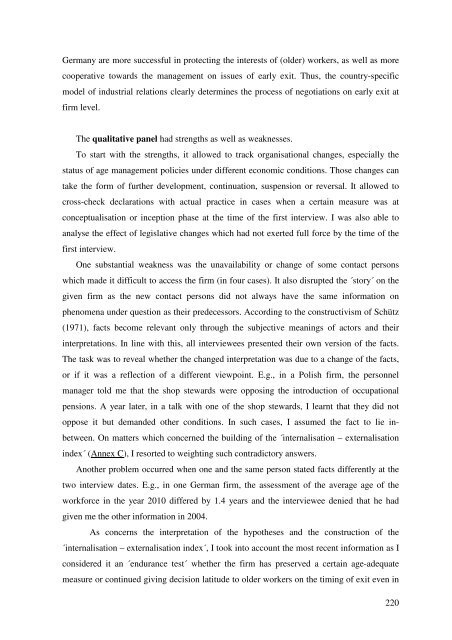Dissertation_Paula Aleksandrowicz_12 ... - Jacobs University
Dissertation_Paula Aleksandrowicz_12 ... - Jacobs University
Dissertation_Paula Aleksandrowicz_12 ... - Jacobs University
Create successful ePaper yourself
Turn your PDF publications into a flip-book with our unique Google optimized e-Paper software.
Germany are more successful in protecting the interests of (older) workers, as well as more<br />
cooperative towards the management on issues of early exit. Thus, the country-specific<br />
model of industrial relations clearly determines the process of negotiations on early exit at<br />
firm level.<br />
The qualitative panel had strengths as well as weaknesses.<br />
To start with the strengths, it allowed to track organisational changes, especially the<br />
status of age management policies under different economic conditions. Those changes can<br />
take the form of further development, continuation, suspension or reversal. It allowed to<br />
cross-check declarations with actual practice in cases when a certain measure was at<br />
conceptualisation or inception phase at the time of the first interview. I was also able to<br />
analyse the effect of legislative changes which had not exerted full force by the time of the<br />
first interview.<br />
One substantial weakness was the unavailability or change of some contact persons<br />
which made it difficult to access the firm (in four cases). It also disrupted the ´story´ on the<br />
given firm as the new contact persons did not always have the same information on<br />
phenomena under question as their predecessors. According to the constructivism of Schütz<br />
(1971), facts become relevant only through the subjective meanings of actors and their<br />
interpretations. In line with this, all interviewees presented their own version of the facts.<br />
The task was to reveal whether the changed interpretation was due to a change of the facts,<br />
or if it was a reflection of a different viewpoint. E.g., in a Polish firm, the personnel<br />
manager told me that the shop stewards were opposing the introduction of occupational<br />
pensions. A year later, in a talk with one of the shop stewards, I learnt that they did not<br />
oppose it but demanded other conditions. In such cases, I assumed the fact to lie inbetween.<br />
On matters which concerned the building of the ´internalisation – externalisation<br />
index´ (Annex C), I resorted to weighting such contradictory answers.<br />
Another problem occurred when one and the same person stated facts differently at the<br />
two interview dates. E.g., in one German firm, the assessment of the average age of the<br />
workforce in the year 2010 differed by 1.4 years and the interviewee denied that he had<br />
given me the other information in 2004.<br />
As concerns the interpretation of the hypotheses and the construction of the<br />
´internalisation – externalisation index´, I took into account the most recent information as I<br />
considered it an ´endurance test´ whether the firm has preserved a certain age-adequate<br />
measure or continued giving decision latitude to older workers on the timing of exit even in<br />
220
















